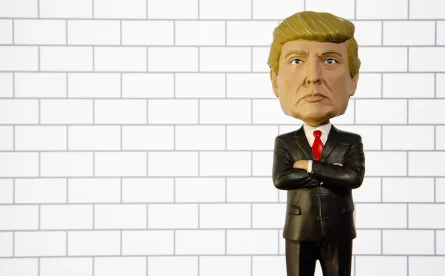During the 2016 presidential debate, Senator Marco Rubio taunted Donald Trump for having “small hands.” Now, more than seven years later, progressive activist Steve Elster is continuing his fight to trademark the phrase “Trump Too Small” to use on shirts and hats. The shirts would include the phrase to insinuate that President Trump’s policies are inadequate, namely “small on the environment . . . civil rights . . . immigrant rights . . . LGBTQ rights . . . workers’ rights . . . voting rights . . . [and] affordable health care for all.”
The Supreme Court announced on June 5 that it would resolve the case of Vidal v. Elster, which focuses on Elster’s unsuccessful attempt at trademarking “Trump Too Small.” The Patent and Trademark Office (USPTO) refused to register the mark citing Section 2(c) of the Lanham Act, which prohibits an individual from registering a trademark containing a living person’s name, absent the individual’s consent1. Elster appealed the decision, arguing that the statute infringed on his First Amendment right to express his political opinion. The US Court of Appeals for the Federal Circuit agreed, finding the provision unconstitutional. The unanimous panel of judges stated that “[t]here can be no plausible claim that President Trump enjoys a right of privacy protecting him from criticism.” The Biden administration appealed the decision to the Supreme Court, arguing that Elster is still capable of openly expressing his opinion but prevented from registering a trademark.
There have been over 200 applications to register the “Trump” name since August 2015, with the USPTO only approving 21 applications as a direct result of the Lanham Act. Donald or Ivanka Trump consented to 19 of the approved trademark applications, and the other two used the word “trump” without making a reference to the Trump family. In Elster’s case, his use of the “Trump” name serves as political commentary, which raises the question of whether restricting the right to register his mark interferes with his freedom of expression. This case will join the thread of Supreme Court cases regarding aspects of trademark law that may or may not violate the First Amendment. In 2017, the court confirmed that trademarks are protected speech under the First Amendment and held that the provision of the Lanham Act that bars registration of “disparaging” marks violated applicants’ freedom of expression. Two years later, the court again ruled that another provision was unconstitutionally restrictive because it prevented registration of trademarks that the USPTO found to be “immoral” or “scandalous.”
However, in the most recent Supreme Court trademark case, the justices shifted away from these past decisions when deciding whether a dog toy that mimicked a Jack Daniel’s bottle of whiskey was protected by the First Amendment or was instead a trademark violation. In this case, the court held that “marks used in connection with commentary, criticism, and parody are not exempt from [trademark infringement and] dilution claims when the mark is used to designate the source of goods and services,” even if the trademark “is also used in an expressive manner.”
By preventing the registration of a living person’s name, one of the main goals of Section 2(c) is to avoid confusing consumers. Elster argues that because the mark criticizes former President Trump, the risk of consumers believing that Trump endorsed the product himself is low. Instead, Elster argues that the statute is poorly drafted and really aims “to protect rights of privacy and publicity,” which should not be a primary concern of the government in trademark law. The provision ultimately protects only “celebrities and world-famous political figures,” giving “special protection” to presidents, “the least private name in American life.”
If the court upholds the statute, many fear that public figures such as politicians would be able to monopolize consumer products in the marketplace, ensuring that their names are used only in the manner in which they consent, silencing critics, in essence. Public officials and public figures face a higher barrier than the general public in bringing defamation claims. To succeed, they must show the defamatory statement was made with “actual malice,” which means actual knowledge that with the statement was false, or reckless disregard for the truth, as established in New York Times Co. v. Sullivan, a famous Supreme Court case decided in 1964. The principle behind the heightened standard is that unrestricted speech is essential to democracy, particularly when it concerns commentary on those who have entered the public spotlight or hold a public office and can significantly influence matters of public importance. Making it easier for public figures to bring defamation lawsuits could chill speech and deter public debate. Viewing trademark law with the same framework suggests that the law needs to similarly balance preventing consumer confusion and preserving the free speech rights of the public.
The ability to criticize politicians is a core tenet of the First Amendment. The Supreme Court is now tasked with deciding whether trademark law can supersede this constitutional right. In Elster’s view, preventing the registration of his trademark essentially closes the door to this form of public commentary. On the other side, there is a growing concern over privacy and having control over one’s own likeness. The justices will need to determine how to balance the “Trump Too Small” phrase’s criticism of a government official, which is protected by the First Amendment, with trademark law’s protection against confusing consumers about the product’s true source. The case will likely be heard later this year.
Article author Morgan Band is a summer associate in Katten’s New York office. Intellectual Property associate Cynthia Martens, New York, contributed to this article.
[1] The USPTO also initially cited Section 2(a) of the Lanham Act, which precludes registration of a mark that falsely suggests a connection or association with persons, living or dead, but the Trademark Trial and Appeal Board (TTAB) affirmed solely on the Section 2(c) ground.




 />i
/>i

